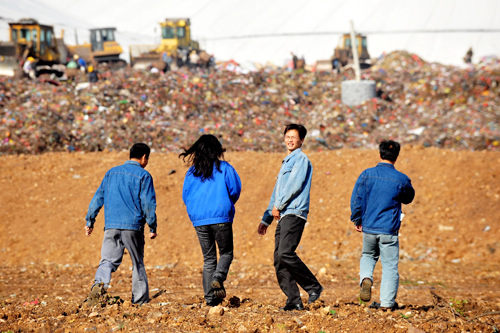|
 |
|
BURYING THE TRASH: Technicians inspect a landfill in Liuzhou, Guangxi Zhuang Autonomous Region, on December 26, 2010 (HUANG XIAOBANG) |
A series of photos named Rubbish-besieged City, which won Wang Jiuliang the Golden Award for Excellence at the Lianzhou International Photo Festival 2009, has attracted considerable public attention after being posted on Tianya.cn, a popular Chinese Web forum. The photos document Beijing's so-called "seventh ring road," a vast area on the fringes of the city covered with more than 400 landfill sites.
"I want society to realize that we are living in a city surrounded by trash," said Wang, a 34-year-old freelance photographer.
Starting in October 2008, Wang visited several large rubbish dumps around Beijing and took more than 4,000 photos. Some of the dumpsites cover as much as 10,000 square meters scattered around Beijing's fifth and sixth ring roads. When Wang marked out their locations in yellow on Google Earth, he was struck by the image of a capital surrounded by trash.
According to statistics from the Beijing Municipal Commission of City Administration (BMCCA), residents in Beijing produce around 18,000 tons of solid waste every day. In 2010, they generated 6.35 million tons of garbage and the amount is growing at the rate of 8 percent every year.
About 90 percent of household garbage in Beijing ends up in landfills, which occupy more than 1,300 hectares of land and this area is increasing by 33 hectares every year. At this rate, all of Beijing's current landfills will be full to capacity within four years.
Besides Beijing, cities across China are surrounded by ever expanding garbage dumps.
According to the Shanghai-based Oriental Morning Post, Shanghai now produces 20,000 tons of household garbage a day, and that number is growing rapidly. These volumes of garbage have placed huge pressure on the city's waste treatment facilities, which can only handle 18,000 tons a day.
Nearly 14,000 tons of waste is now produced each day in Guangzhou, capital of southern Guangdong Province, which has a population of more than 10 million, according to the Guangzhou Commission of Urban Management.
The surging amount of garbage produced in cities due to the country's rapid urbanization has exceeded treatment capacity, said a statement released by the State Council, China's cabinet, in April.
Since China overtook the United States as the world's largest producer of household garbage in 2004, the amount of garbage produced by its residents has been rising at a rate of 8-10 percent a year. In 2010, China produced 152 million tons of waste.
The country's waste treatment facilities, according to the China Association of Environmental Protection Industry (CAEPI), are capable of treating only 112 million tons each year.
About two thirds of China's 668 major cities are surrounded by garbage sites covering a combined area of 500 million square meters, incurring economic losses of more than 30 billion yuan ($4.39 billion) a year.
| 